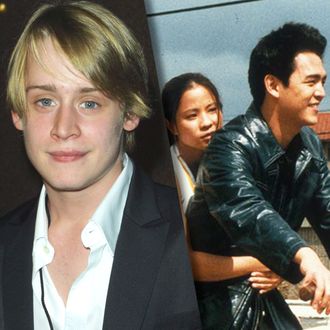
Hot on the heels of a USC study calling the film industry a “straight, white, boy’s club,” the New York Times brings a selection of interviews about what Hollywood is like for those who aren’t lucky enough to be members of that club. The most darkly comic of all comes from director Justin Lin, who recalls the struggle to finance his debut film, Better Luck Tomorrow, a thriller about a group of amoral Asian-American high-schoolers. Race is central to the story, but the nonwhite cast made it a hard pitch. “I was meeting with potential investors, and right away everybody’s like, ‘It’s an Asian-American cast. It’ll never sell.’ And a lot of them were Asian-American investors,” Lin recalls. One of them even had a brilliant idea, which would be hilarious if it weren’t so sad: “A guy offered $1 million for the budget, and he said, ‘We’ll get Macaulay Culkin to be the lead.’” That didn’t happen, of course; Lin stuck to his guns and cast Parry Shen as the lead, and the film became a Sundance sensation.
Other tales of Hollywood not walking the walk on race include:
America Ferrera resorting to whiteface:
I was 18 and putting myself on tape for a movie I really wanted. I got that phone call: They cast a Latino male in another role in the film; they’re not looking to cast [a Latina]. So I defiantly bleached my hair blond, painted my face white and made the audition tape. I never heard back. I just remember feeling so powerless.
Casting directors explaining to Wendell Pierce that black people couldn’t do Shakespeare:
In 1985, I’m sitting in the casting office of a major studio. The head of casting said, “I couldn’t put you in a Shakespeare movie, because they didn’t have black people then.” He literally said that. I told that casting director: “You ever heard of Othello? Shakespeare couldn’t just make up black people. He saw them.”
Eva Longoria not being “Latin enough”:
I remember moving to L.A. and auditioning and not being Latin enough for certain roles. Some white male casting director was dictating what it meant to be Latin. He decided I needed an accent. He decided I should [have] darker-colored skin.
Sam Esmail on casting Rami Malek in Mr. Robot:
[In auditions], it was mostly white guys. I opened up the process, and Rami [Malek] was just brilliant. He looks different, whether that’s because he is Egyptian [or] just Rami. The conversation with the network was tough; I don’t think it had to do with race — or I’d like to think it didn’t. The show is already unusual. The barrier to entry for a show — from a network’s point of view — is, can the audience identify with this person, and is race going to be a roadblock?
Producer Lori McCreary on how even Morgan Freeman wasn’t considered presidential:
If [a script doesn’t specify, a role is] presumed to be white and male. For Deep Impact, Mimi Leder, the director, wanted to cast Morgan as the president, and somebody at the studio said, we’re not making a science-fiction movie; you can’t have Morgan Freeman play the president. But she really fought for it.
And there is much, much more where that came from. Read the whole thing over at nytimes.com.


